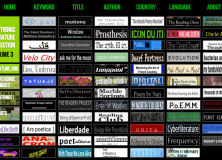Your cart is currently empty!
Mark Marino
-
CFP: International Conference on Digital Media and Textuality (5 July; 3-5 Nov 2016)
CFP: International Conference on Digital Media and Textuality 3rd to 5th November 2016, Universität Bremen, Germany Conference chair: Dr. Daniela Côrtes Maduro Deadline for Submissions: 5 July 2016 Website: https://digmediatextuality.wordpress.com/… Read more.
·
-
ELO 2016 Begins!
ELO 2016 at University of Victoria, Victoria, Canada http://elo2016.com #ELO16, #DHSI2016 Over 190 participants have arrived from around the world to Victoria, Canada for the 2016 international conference of the… Read more.
-
Meet ELO’s New Communication Team
As ELO continues to grow and develop as an organization, we have an increasing number of activities and opportunities to share with our members and the world at large. Â To… Read more.
·
-
Mark Sample Joins ELO Board
ELO is pleased to announce that Mark Sample will be joining the Board of Directors. Â Mark is a well-established scholar in the field of digital humanities and is also an… Read more.
·
-
Anastasia Salter Joins ELO Board
The Electronic Literature is pleased to welcome its newest Board Member Anastasia Salter. Anastasia has most recently served as an editor of the Electronic Literature Collection, Volume 3 and brings… Read more.
-
April is ePoetry Month
 During the month of April, the USA celebrates National Poetry Month, a literary celebration inaugurated by theAcademy of American Poets in 1996. To join the celebrations, the Electronic Literature Organization and I ♥… Read more.
-
Launching The Electronic Literature Collection, vol. 3
Electronic Literature Collection, vol. 3 Announcing the publication of the Electronic Literature Collection Volume 3, which launched today at an event at the Stedman Art Gallery at Rutgers University, Camden.… Read more.
-
4Humanities “Shout Out for the Humanities” Contest
4Humanities “Shout Out for the Humanities” Contest info:http://4humanities.org/contest/ Your submission to this contest should answer such questions as: Why is studying the humanities–e.g., history, literature, languages, philosophy, art history, media history, and… Read more.
-
Call for Submission: 2016 ELO Prize (Feb 1-28, 2016)
Call for the 2016 ELO Prize (Feb 1-28, 2016 Submission Period) See Full Details Here The Electronic Literature Organization is proud to offer the following two prestigious awards, “The Robert… Read more.
-
CFP: ELO 2016: Next Horizons (11/15/15; 6/10-12/16) Victoria, B.C.
Next Horizons: ELO 2016
 10-12 June 2016 University of Victoria, Victoria, B.C. Deadline for Scholarly Activities & Media Art Festival Works: November 15, 2015 Click here for the Submissions Form… Read more.
·


